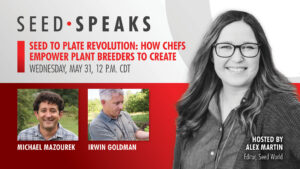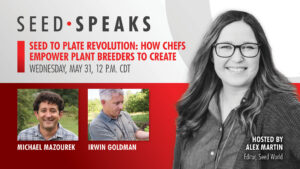When you start thinking about your audience, plant breeding changes from a science to an art form.
If you’ve worked in the world of marketing, you’ll know one of the most important things to keep in the back of your mind while creating content is your audience. Without that clear cut picture of who you’re marketing or selling to, a product could flop.
While audience might not be the first thing you think of when considering plant breeders, it’s important for a breeder to keep in mind whom they’re breeding for as well.
“To think of it as an audience makes me think of plant breeding as a performance in a way — which I think it is,” says Irwin Goldman, a professor in the Department of Horticulture at the University of Wisconsin-Madison. “Plant breeding is the slowest of the performing arts!”
Who exactly is the ideal audience, though? The easiest answer is the grower, but for someone like Goldman, that audience can be a little broad.
“For me in the public plant breeding sector, there’s a pretty wide range of characters which includes obviously the farmers and gardeners of the state,” he says. “But, the kinds of public germplasm we can create has the potential to grow all over the world.”
Other breeders, like Johnny’s Selected Seeds’ Lindsay Wyatt, has a bit more obvious of a scope.
“In a lot of cases, I know exactly who my audience is because we know who buys our seeds,” Wyatt, a squash and pumpkin breeder at Johnny’s, says. “Generally, we consider our core customers to be advanced home gardeners and mixed-market growers — people who sell things through CSAs or through farmer’s markets.”
Though those audiences might differ in terms of scope, Wyatt and Goldman agree: the most important factor is that a breeder is listening to their audience throughout the supply chain.
That means, not only is it important to consider your grower’s thoughts, but another consideration falls down to the consumer.
Goldman says it’s important to ask yourself a few questions about the consumers: who’s going to eat this food? What are they eating it for, what are they eating it with? How do they prepare it? Knowing a bit more about the reasoning behind the variety helps as well.
For Wyatt, she also enjoys growing some of the varieties at home herself.
“I do home gardening and am able to experience that sort of thing — I like to eat at restaurants that source local produce and I like to cook my own squash,” she says. “That allows me to be part of the system and helps me keep those ideas internalized as I’m working.”
An easy way, besides gardening yourself, to collect feedback from your audience, though, is just to connect with them, Goldman says. Fortunately, there’s a lot of ways breeders can do this, starting with the most traditional ways, like participating in field days.
But, Goldman’s favorite way to collect feedback is a bit more nontraditional.
“Increasingly, we text each other, we talk on the phone, we meet at other kinds of events,” Goldman says. “I’ve gotten more involved with the culinary community, which includes chefs and other food professionals — we meet at dinners and events, and it’s really those conversations that inform the work we’re doing. There’s a huge variety of formal and informal channels for that information to get to me, and one of the most effective methods is people getting my number off my webpage and sending me a message.”
Forming those connections — whether it’s at a farmer’s market, a conference or a field trial — is critical to helping immerse yourself in their shoes. But, if you’re still having trouble picturing your audience, Wyatt recommends writing down a target profile.
“You can really sit down and think about what your customer needs, and then write out all of the traits — like the yield needs to meet or exceed this variety, it needs to taste good and so forth,” Wyatt says. “Having that all spelled out when you have some time and breathing room in the winter can be really helpful to have on hand when you’re making decisions.”










